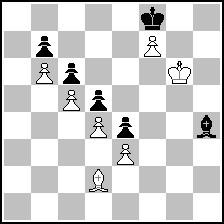
Website founded by
Milan Velimirović
in 2006
6:28 UTC


| |
MatPlus.Net  Forum Forum  General General  e.p. as e.p. can e.p. as e.p. can |
| |
|
|
|
|
You can only view this page!
| | | (1) Posted by Sarah Hornecker [Wednesday, Jun 2, 2010 13:44] | e.p. as e.p. can
Arno Zude
Europa Rochade April 1978, problem no. 75
 (= 6+4 ) (= 6+4 )
Mate in 4
Some solvers found 1.gxh6 e.p.+ and mate in the fourth move which was wrong, of course (the last move doesn't have to have been h7-h5). This reminds me that I saw some studies or problems beginning with en passant capture where the last move by no means has to have been the double step by the pawn.
At which time was it invented that for en passant the double step of the pawn must be proven? Can someone name examples of such en passant problems where the move was not proven?
An example I was able to find now without using CQL:
E. Lequesne
La Stratégie 1870, problem no. 10
 (= 7+6 ) (= 7+6 )
White to move and win
1.cxd6 e.p.
| | | (2) Posted by Hauke Reddmann [Wednesday, Jun 2, 2010 14:43] |
Well, guilty as charged :-)
(Somewhen in INSELSCHACH for some April special issue or thatlike,
I made up something like Ka1 Pa4 d4 g4 h5/Ka8 Pa5 Pd5 Pg5 Ph6, +.
Of course my logic was: The fact that the author stipulates
"White to win", is equivalent to the fact that White CAN win,
which proves that e.p is legal. If you're an eskimo, I also have
some nice freezers for you.)
Hauke
| | | (3) Posted by Cornel Pacurar [Wednesday, Jun 2, 2010 17:58] |
Hauke, just to let you know that in Canada and Greenland, the term "Eskimo" has fallen out of favour, as it has often been used in a racist or demeaning way over the years and the Natives consider it pejorative and prefer the term "Inuit"!..
| | | (4) Posted by Michael McDowell [Wednesday, Jun 2, 2010 20:47] |
John Beasley investigated early “en passant key” problems in The Problemist in 2004 and gave the following problem as the first sound attempt at an e.p. key where the last move can be proved:
Anonymous
Schachzeitung 1858
 (= 8+5 ) (= 8+5 )
Mate in 3
1.dxc6ep+ Kd5 2.Sf2
John and Hanspeter Suwe concluded that the composer was Max Lange (the lengthy reasoning can be found in The Problemist for May and September 2004).
| | | (5) Posted by Olaf Jenkner [Thursday, Jun 10, 2010 18:21] |
I found 655 problems in the PBD:
http://www.softdecc.com/pdb/search.pdb?expression=k=%27en%20passant%20as%27
Olaf
| | | (6) Posted by [Saturday, Jun 12, 2010 08:08]; edited by [10-06-12] |
Michael McDowell wrote:
>Mate in 3
It's not of any major importance in this context, but the original stipulation(s) was/were: 'Weiss zieht und soll auf die kürzeste Weise
Matt setzen' and 'Matt in wie viel Zügen?', i.e. equivalent to the modern 'Mate in how many moves?'
I was not aware that the authorship of this problem had been the object for a lengthy investigation. Perhaps I'm merely duplicating
the original article, but as the problem appears on p. 61 together with a problem by 'Fräulein J. v. S. in H.', and problems on p. 61
appear twice in the annual index, once for 'S., v. (Frl.).', and once for 'Lange, Max', Lange is clearly the first candidate to
the authorship.
But perhaps there are additional complications I don't know about.
Added: As the printed solution goes into the legality of the position, it is clear that the author did take care over it. However, Lange's Handbuch,
published in 1862, lists a few en-passant key problems (not the cited one!), but as legality of position is not important in those, I would not think
this problem was more than a curiosity at the time. (The cited problem is mentioned in a footnote on p. 113 as a problem of a
'shortest mate?' stipulation -- haven't found it mentioned in the very short section on e.p.) As en passant and castling keys were regarded as fit
only for Christmas problems (or similar jokes) for at least another 35 or 40 years, I'd guess that e.p. key legality did not really become
a generally accepted requirement until around 1900 or so.
| |
No more posts |
MatPlus.Net  Forum Forum  General General  e.p. as e.p. can e.p. as e.p. can |
|
|
|
 ISC 2024
ISC 2024 Forum
Forum  General
General  e.p. as e.p. can
e.p. as e.p. can 


